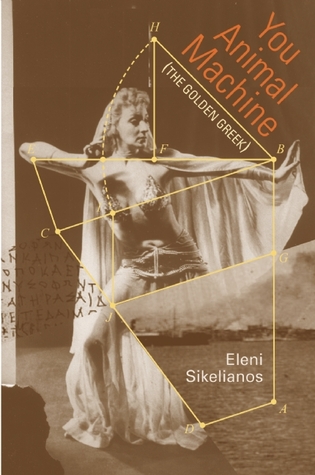In the Mojave Desert, poet Eleni Sikelianos writes in her slippery, edges-all-over essay-memoir You Animal Machine, you can never see anything straight on. Sights are caught in the corner of the eye: a potent detail, a skittering movement, a mirage. So it is with the story of Sikelianos’s grandmother Melena—exotic dancer, rock-hound, survivor of five husbands—as Sikelianos tells it: her story is particulate, dispersing into details that fly apart and randomly collide again, allowing coherence to be glimpsed only sidelong. “Shake it up at the corners as you would a blanket,” Sikelianos says of the Mojave, where Melena ended her days: “that’s the story: the dust like agitated electrons up to no good… If you look closely you’ll see that everything’s on the verge of impact.”
Through artifacts—lists of songs, newspaper clippings, photographs, film posters, staged interviews, poems—the poet Sikelianos assembles a textual chimera that keeps sliding through her fingers. “I can’t seem to keep her in reality,” she writes of Melena, known as the Leopard Girl. “She keeps slipping out into the desert… She keeps slipping back into cat.” Even text, it seems, can’t hold her still: Melena’s very name shifts and changes, its “letters feral and bouncing like blobs of dark light jostling for places.” Born Helene Pappamarkou, she is variously known as Elaine, Elayne, Eleni, the Golden Greek, Marco the Cat Girl, and Melaine Marko. Melaina means “black” in Greek, and Sikelianos also associates Melena with Demeter Melaine, Greek goddess of fertility and agrarian mysteries, who allows things (plants, the dead) to rise up from the earth—and whose daughter, Persephone, was raped and abducted by Hades. Fertility has a dangerous edge here, its mysteries tended by goddesses and temple dancers, Melena’s precursors in the burlesque. Like them, “she is swallowed deep underground but… pops back up with the crocuses at the end of the dance.”
The story begins, psycho-genealogically speaking, with the author’s great-grandfather, a Greek immigrant and musician known as John Diamond or Diamond John, who “locked his daughter in the closet with a loaf of bread and a jug of water” and left her there for days. The rest of his children were dropped off at an orphanage and never picked up. Melena finds one brother forty years later; the fates of the rest, even their names, are unknown. But it’s the locked closet that serves as Melena’s (and her daughter’s, and her daughter’s daughter’s) primal scene: it is what puts her, as Sikelianos has it, “on the wrong side of her magic.” Farmed out to orphanages and foster homes while she’s on the exotic-dance circuit, Melena’s own daughters inherit her hurts. At one point they are housed with a family that shuts one in a heated oven, puts another in a sealed box and rolls it down the basement stairs, and makes the children fight each other with rakes. “It’s true she was practically flayed alive,” Sikelianos writes of her mother, Elaine, “walking, skinless, a sack of flesh and jagged nerve, the poison dress of the skin skinned right off.” Neglect, abuse, and sexual violence repeat, leaving a mark on each female generation: “What can you read in my body about the family homes?” Sikelianos writes. “It’s not in the hard tissue. They call it a developmental insult.” A portion of the book is dedicated to so-called “feral children,” on whom abuse has inflicted a form of “psychogenic dwarfism,” and who become in this way animal, like Melena changing clothes.
Every family story, Sikelianos says, is a hybrid beast, built of “a man and a woman, two by two, each representing a small electrical hyphen of human intelligence and endeavor.” Telling it requires breaking down these composite parts, though, pulverizing the links. While The Book of Jon, her 2004 memoir of her father, offered one half of such an uncoupling, this book concerns someone who is herself a doubled thing—bearing psychogenic wounds, she must be pulverized, ripped apart to be made free. But this is what Melena did to herself every night, a half beast who stripped off her animal skin to turn human again, her body arriving in pieces before the audience’s gaze.
In her dark slide through language, Sikelianos finds room to move between the verb shed and the “cooch shed,” where the hoochie-coochie dance was invented, giving us striptease as a molting—a flaying-open in dance. Although the body can never be free of its developmental deformations—this is and isn’t a story of redemption—a feral creature can do what it likes. With her leopard suit, sewn by hand one night, Melena “made her own new skin and then she shed it.” “This,” Sikelianos writes, “is how you start from scratch.” It’s also how the immigrant comes home: a sun-bleached American dream leading from nightclub leopard girl to wild Mojave Desert cat.
Sikelianos’s evidence is fragmentary. The book is full of cropped images—Melena’s hand, stomach, mouth, “dissectible chest,” and “sliver of breast revealing half the earth in light.” Lines break in the middle; voices appear and fade away; paragraphs change midstream. Gathering these stories, these facts, the poet had to choose between wholes and details, between coherent generalizations—a story—and a potent, piecemeal evocation of what was, just as Melena’s body and its scars are revealed piece by piece in her dance. The text, as a result, is tough as nails: you can feel Sikelianos at work, forcibly stitching it with catgut string, only to watch it fly apart again as it is ripped off like a leopard-print bra. This, maybe, is Sikelianos’s own form of the dance: “the slow massacre, the pulverizing hand of wind.” It seems, too, in some real way, her inheritance.





